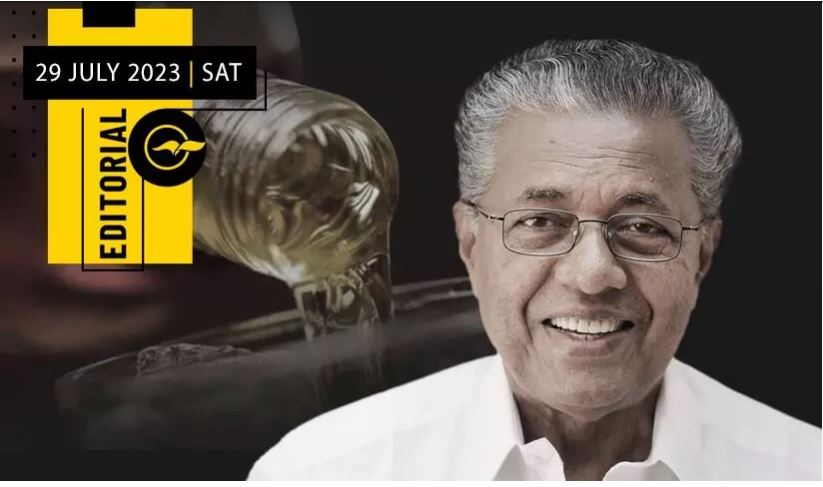
The Left government’s liquor dependency
text_fieldsThe Left Front made certain promises in their manifesto for the 2021 state assembly elections, one of which was that they would gradually reduce the availability and consumption of alcohol. They intended to enforce government interventions to encourage abstinence from alcohol and initiate a large-scale awareness movement. Similar promises had found a place in their 2016 manifesto, but during the past seven years, the Left government has failed to fulfil any of these pledges even for a single day. Instead, the liquor policy each year has contributed to an increase in alcohol availability in the state. Most recently, the second liquor policy of the second Pinarayi government did not make any significant efforts to address this issue. On the contrary, the government has decided to actively promote the production and distribution of various alcoholic beverages, including Indian-made foreign liquor, beer, toddy, low-strength fruit liquor, and wine. They have even sought to expand the distribution network by reopening the beverage outlets that were closed and issuing special licences to certain restaurants for selling beer and wine to foreign tourists and others during the tourism season. Additionally, the government aims to increase the production and export of Indian-made foreign liquor and extra-neutral alcohol for the local alcoholic beverage industry. With the implementation of these policies, it is ertain that Kerala's alcohol consumption is set to rise, making the state one steeped in liquor.
The primary objective of the new liquor policy is clear: to boost revenue through increased liquor sales. It is expected that the implementation of this policy will surpass the budgeted excise revenue. The government has raised the bar licence fee from Rs 30 lakh to Rs 35 lakh, and the FL-4 license fee for serving liquor from Rs 50,000 to Rs 2 lakh. Additionally, they plan to open 250 new beverage outlets, introduce alcohol sales in industrial parks similar to IT parks, and promote toddy sales under the name 'Kerala Toddy.' The government aims to turn the tourism season into a liquor festival, further contributing to increased revenue. While this might provide some relief to the Finance Department amid economic challenges aggravated by the Centre's finance policies, such an approach will undoubtedly have significant social consequences. At present, Kerala already has high alcohol consumption, with six lakh litres of liquor being sold in the state daily, alongside toddy and other alcoholic beverages, generating over 50 crore rupees per day or about a quarter of a million rupees annually. With the further liberalization of the liquor policy, the daily revenue is estimated to exceed 75 crores. However, it is crucial to recognize that this focus solely on economic goals may lead Kerala down a path with many social repercussions. The consequences of such a move need to be carefully pondered over, given the potential impact on society as a whole.
Despite the availability of various methods prescribed by the constitution to raise public resources, governments heavily rely on tax revenue from the sale of lottery, liquor, petrol, etc., while overlooking other avenues. Even within this spectrum of sources, it is evident from figures of the last five years that alcohol and lottery have contributed at least 35 per cent of the total revenue collection. It can be said that two 'intoxicants' are keeping Kerala's coffers from emptying. Recently, the government increased lottery prices; and now, it is seeking to boost revenue through increased alcohol sales, which is clearly a deviation from the Left government's declared policy of promoting abstinence from alcohol and gradually reducing its availability and consumption. The new liquor policy aims to reopen all closed liquor shops in the state, undermining the 'Vimukti' (emancipation) scheme introduced by the government as part of its alcohol abstinence program. While it is claimed that the 'Vimukti' activities will be intensified, the concern remains that the widespread availability of alcohol, even in small villages, may prevent illegal drug use, but legal intoxication will continue unabated. The government's commitment to such an alcohol-centric policy, especially during times when social problems caused by alcohol are escalating, raises questions about who the government is answerable to. There is a fear that such a policy could lead to a new alcohol-related health emergency. It is imperative that this policy of the government that pushes people into intoxication is corrected.




















